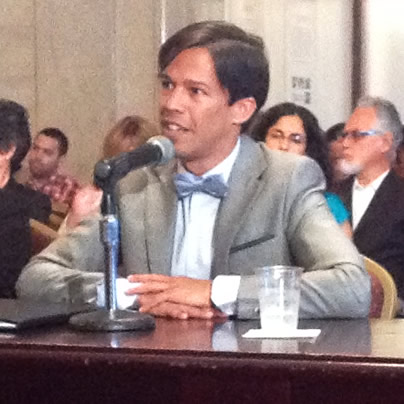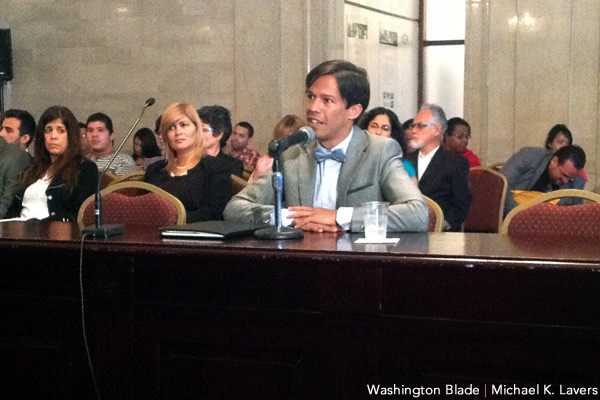National
Puerto Rico Senate approves non-discrimination bill
Passage seen as turning point in island’s LGBT rights movement


Pedro Julio Serrano of the National Gay and Lesbian Task Force testifies in support of a Puerto Rico adoption bill on Friday, May 17. (Washington Blade photo by Michael K. Lavers)
SAN JUAN, Puerto Rico—LGBT rights advocates here last week celebrated the passage of a sweeping bill that would ban discrimination based on sexual orientation and gender identity and expression in the U.S. territory.
The 15-11 vote in the Puerto Rico Senate on May 16 took place after lawmakers for several hours debated Senate Bill 238 that Sen. Ramón Nieves Pérez of San Juan introduced in January.
“The country, you and I are sick and tired of the marginalization,” Sen. Mari Tere González López of Mayagüez said.
Sen. Thomas Rivera Schatz of San Juan is among those who spoke against the bill.
“This Senate speaks of tolerance but discriminates against those who don’t have the same political ideology,” he tweeted during the debate.
A triumphant Pedro Julio Serrano of the National Gay and Lesbian Task Force greeted dozens of LGBT rights advocates and other supporters who had gathered outside the Capitol after the vote. Singer Ricky Martin and New York City Council Speaker Christine Quinn are among those who also applauded SB 238’s passage.
“We are celebrating this victory,” Serrano told the Washington Blade outside the Capitol, noting Rivera has previously referred to him as a “faggot.” “The people are celebrating with us. It is an extraordinary step forward.”
Senators approved SB 238 three days after San Juan Mayor Carmen Yulín Cruz issued two executive orders that banned discrimination against the city’s LGBT municipal employees and mandated the Puerto Rican capital’s police department to equally investigate domestic violence cases regardless of the alleged victim’s sexual orientation or gender identity. She was also inside the Senate chamber when lawmakers approved the measure.
The historic vote took place less than four years after the November 2009 murder of gay teenager Jorge Steven López Mercado sent shockwaves across Puerto Rico.
Serrano, Quinn and others repeatedly criticized then-Gov. Luís Fortuño for his failure to publicly speak out against rampant anti-LGBT violence on the island in the months after the crime. They also noted Puerto Rican prosecutors remained reluctant to convict anyone under the territory’s hate crimes law that includes sexual orientation and gender identity and expression.
The Puerto Rico Senate in late 2011 approved a proposal that would have eliminated LGBT-specific protections from the aforementioned statute.
The Puerto Rico Supreme Court in February narrowly upheld the island’s ban on gay second parent adoptions.
Dr. Carmen Milagros Vélez Vega, whose partner of 25 years, Dr. Ángeles Acosta Rodríguez, sought to adopt their 12-year-old daughter she conceived through in vitro fertilization, on May 17 testified in support of a bill that González introduced earlier this year that would extend second-parent adoption rights to gays and lesbians on the island.
Vega received a standing ovation from Senate Bill 437 supporters who attended the Senate Judiciary, Security and Veterans Committee hearing after she finished her testimony.
“Us three are a Puerto Rican family, one among many,” she said as Acosta and their daughter, Juliana María Acosta Vélez Vega, sat next to her. “We are here, not for the sake of receiving special treatment, nor to seek a privilege, but to present ourselves as citizens and daughters of this country and to ask for that which is granted to Puerto Rican families and children, the right to a family and the protections that that includes.”
The SB 437 hearing took place hours before thousands of people took part in an LGBT rights march from La Fortaleza, the governor’s official residence in Old San Juan, to the Capitol that coincided with the annual International Day Against Homophobia.
Yulín, who unfurled a gay Pride flag from the balcony of City Hall with Nieves during the march, spoke to marchers from the Capitol steps as she stood with members of the Butterflies Trans Association, a transgender advocacy group, while wearing a white headband that said “equity.”
“I say from the bottom of my heart to those who are listening to us — all of Puerto Rico; we are all equal,” she said.
Optimism despite death threats
FBI agents on May 17 arrested Joseph Joel Morales Serrano at his San Juan home for allegedly threatening to kill Serrano at the IDAHO march in a tweet that referenced the Boston Marathon bombings he posted earlier this month.
The Primera Hora newspaper reported Serrano had been planning to attend the march, but he returned to New York City where he lives to accept an award from the Latino Commission on AIDS. His mother, Alicia Burgos, spoke on his behalf.
“We are marching against homophobia,” she said.
Eduardo, who traveled to San Juan from Ponce on Puerto Rico’s southern coast with a group of nearly 150 people, expressed a similar message.
“We are here because we want equality,” Eduardo told the Blade. “We want the same equality that everybody else has.”
The Puerto Rico House of Representatives had been expected to vote on the non-discrimination and the gay second-parent adoption bills on Thursday. A third bill introduced in the chamber in January would add sexual orientation and gender identity and expression to the island’s anti-domestic violence laws.
“It’s just about basic human rights,” Bayamón resident Héctor Maldonado told the Blade as he waived a rainbow flag across the street from the Capitol before senators approved SB 238.
Gov. Alejandro García Padilla supports both the non-discrimination and adoption measures.
“Puerto Rico is on the brink of history,” Serrano said, noting polls that indicate the majority of the island’s residents support expanded rights for LGBT Puerto Ricans. “LGBT rights are advancing and we will have two bills become law in the next few days.”
U.S. Supreme Court
Supreme Court to consider bans on trans athletes in school sports
27 states have passed laws limiting participation in athletics programs

The U.S. Supreme Court on Thursday agreed to hear two cases involving transgender youth challenging bans prohibiting them from participating in school sports.
In Little v. Hecox, plaintiffs represented by the ACLU, Legal Voice, and the law firm Cooley are challenging Idaho’s 2020 ban, which requires sex testing to adjudicate questions of an athlete’s eligibility.
The 9th U.S. Circuit Court of Appeals described the process in a 2023 decision halting the policy’s enforcement pending an outcome in the litigation. The “sex dispute verification process, whereby any individual can ‘dispute’ the sex of any female student athlete in the state of Idaho,” the court wrote, would “require her to undergo intrusive medical procedures to verify her sex, including gynecological exams.”
In West Virginia v. B.P.J., Lambda Legal, the ACLU, the ACLU of West Virginia, and Cooley are representing a trans middle school student challenging the Mountain State’s 2021 ban on trans athletes.
The plaintiff was participating in cross country when the law was passed, taking puberty blockers that would have significantly reduced the chances that she could have a physiological advantage over cisgender peers.
“Like any other educational program, school athletic programs should be accessible for everyone regardless of their sex or transgender status,” said Joshua Block, senior counsel for the ACLU’s LGBTQ and HIV Project. “Trans kids play sports for the same reasons their peers do — to learn perseverance, dedication, teamwork, and to simply have fun with their friends,” Block said.
He added, “Categorically excluding kids from school sports just because they are transgender will only make our schools less safe and more hurtful places for all youth. We believe the lower courts were right to block these discriminatory laws, and we will continue to defend the freedom of all kids to play.”
“Our client just wants to play sports with her friends and peers,” said Lambda Legal Senior Counsel Tara Borelli. “Everyone understands the value of participating in team athletics, for fitness, leadership, socialization, and myriad other benefits.”
Borelli continued, “The U.S. Court of Appeals for the Fourth Circuit last April issued a thoughtful and thorough ruling allowing B.P.J. to continue participating in track events. That well-reasoned decision should stand the test of time, and we stand ready to defend it.”
Shortly after taking control of both legislative chambers, Republican members of Congress tried — unsuccessfully — to pass a national ban like those now enforced in 27 states since 2020.
Federal Government
UPenn erases Lia Thomas’s records as part of settlement with White House
University agreed to ban trans women from women’s sports teams

In a settlement with the Trump-Vance administration announced on Tuesday, the University of Pennsylvania will ban transgender athletes from competing and erase swimming records set by transgender former student Lia Thomas.
The U.S. Department of Education’s Office for Civil Rights found the university in violation of Title IX, the federal rights law barring sex based discrimination in educational institutions, by “permitting males to compete in women’s intercollegiate athletics and to occupy women-only intimate facilities.”
The statement issued by University of Pennsylvania President J. Larry Jameson highlighted how the law’s interpretation was changed substantially under President Donald Trump’s second term.
“The Department of Education OCR investigated the participation of one transgender athlete on the women’s swimming team three years ago, during the 2021-2022 swim season,” he wrote. “At that time, Penn was in compliance with NCAA eligibility rules and Title IX as then interpreted.”
Jameson continued, “Penn has always followed — and continues to follow — Title IX and the applicable policy of the NCAA regarding transgender athletes. NCAA eligibility rules changed in February 2025 with Executive Orders 14168 and 14201 and Penn will continue to adhere to these new rules.”
Writing that “we acknowledge that some student-athletes were disadvantaged by these rules” in place while Thomas was allowed to compete, the university president added, “We recognize this and will apologize to those who experienced a competitive disadvantage or experienced anxiety because of the policies in effect at the time.”
“Today’s resolution agreement with UPenn is yet another example of the Trump effect in action,” Education Secretary Linda McMahon said in a statement. “Thanks to the leadership of President Trump, UPenn has agreed both to apologize for its past Title IX violations and to ensure that women’s sports are protected at the university for future generations of female athletes.”
Under former President Joe Biden, the department’s Office of Civil Rights sought to protect against anti-LGBTQ discrimination in education, bringing investigations and enforcement actions in cases where school officials might, for example, require trans students to use restrooms and facilities consistent with their birth sex or fail to respond to peer harassment over their gender identity.
Much of the legal reasoning behind the Biden-Harris administration’s positions extended from the 2020 U.S. Supreme Court case Bostock v. Clayton County, which found that sex-based discrimination includes that which is based on sexual orientation or gender identity under Title VII rules covering employment practices.
The Trump-Vance administration last week put the state of California on notice that its trans athlete policies were, or once were, in violation of Title IX, which comes amid the ongoing battle with Maine over the same issue.
New York
Two teens shot steps from Stonewall Inn after NYC Pride parade
One of the victims remains in critical condition

On Sunday night, following the annual NYC Pride March, two girls were shot in Sheridan Square, feet away from the historic Stonewall Inn.
According to an NYPD report, the two girls, aged 16 and 17, were shot around 10:15 p.m. as Pride festivities began to wind down. The 16-year-old was struck in the head and, according to police sources, is said to be in critical condition, while the 17-year-old was said to be in stable condition.
The Washington Blade confirmed with the NYPD the details from the police reports and learned no arrests had been made as of noon Monday.
The shooting took place in the Greenwich Village neighborhood of Manhattan, mere feet away from the most famous gay bar in the city — if not the world — the Stonewall Inn. Earlier that day, hundreds of thousands of people marched down Christopher Street to celebrate 55 years of LGBTQ people standing up for their rights.
In June 1969, after police raided the Stonewall Inn, members of the LGBTQ community pushed back, sparking what became known as the Stonewall riots. Over the course of two days, LGBTQ New Yorkers protested the discriminatory policing of queer spaces across the city and mobilized to speak out — and throw bottles if need be — at officers attempting to suppress their existence.
The following year, LGBTQ people returned to the Stonewall Inn and marched through the same streets where queer New Yorkers had been arrested, marking the first “Gay Pride March” in history and declaring that LGBTQ people were not going anywhere.
New York State Assemblywoman Deborah Glick, whose district includes Greenwich Village, took to social media to comment on the shooting.
“After decades of peaceful Pride celebrations — this year gun fire and two people shot near the Stonewall Inn is a reminder that gun violence is everywhere,” the lesbian lawmaker said on X. “Guns are a problem despite the NRA BS.”




















